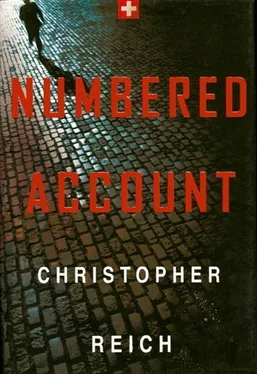“I don’t think so. I only drink with my friends.”
Sprecher started to protest, but Nick had already hung up.
* * *
At 12:35, Nick headed to the Chairman’s office with a final copy of his letter in hand. He sauntered lazily down the quiet hallway. At this hour even the biggest grinds were eating lunch. The floorboards squeaked under his lolling step. Suddenly, he felt the presence of someone behind him.
“Tired or drunk, Neumann?” Armin Schweitzer barked.
Nick was sick of being afraid of Schweitzer. Shaking the papers in his hand, he turned and said, “I couldn’t get the words to flow right, so I took a wee taste of Scotland’s finest. A dram of single malt does wonders for finding the muse.”
Schweitzer smirked. “A smart-ass, no less. Well, on this floor we keep our backs straight and our step spirited. You can wander in the park, if you like. What do you have there?”
“Some ideas the Chairman had for whipping the bank into shape. It’s a letter to be sent to the shareholders.” Nick handed Schweitzer a copy. Why not extend an olive branch? He still wanted to find out what the bastard meant by his father’s “embarrassing behavior.”
Schweitzer skimmed the letter. “Dark days, Neumann. We can never fit Konig’s model of a bank. He prefers machines. We still like the living, breathing variety, thank God.”
“Konig doesn’t stand a chance. He’ll need a mountain of cash if he wants to take us over.”
“Yes, he will. But don’t underestimate him. I’ve never met a greedier man. Who knows where he’s put his mitts? He’s an embarrassment to all of us.”
“Like my father?” Nick asked. “Tell me, what exactly did he do?”
Schweitzer pursed his lips, as if considering how to answer. He sighed and put his hand on Nick’s shoulder. “Something you are much too intelligent to even contemplate, my boy.” He handed the letter back to Nick. “Run along now. I’m sure the Chairman is eager to see his puppy dog.”
Nick rose on his toes, flushed with anger. He bit his tongue but couldn’t resist a parting jab. “My office is open if you’re interested. Help yourself. Never know what you might find there!”
A war council had convened in the executive boardroom. Four men in progressive states of unease were scattered around the immense chamber. Reto Feller stood against the far wall. His arms were folded across his chest, and the heel of his foot was rapidly wearing a hole in the carpet. Rudolf Ott and Martin Maeder sat at the prodigious conference table, the very picture of conspiracy. Each faced the other with hunched back and lowered head, whispering. Armin Schweitzer paced the length of the room. A sheen of perspiration matted his heavy features. Every few steps, he withdrew a handkerchief from his hip pocket and with an unashamed stroke dried his forehead. They all awaited the arrival of their master. On this ship, there was only one captain.
At precisely two P.M., Wolfgang Kaiser threw open the tall mahogany doors and entered the boardroom. He walked briskly to his usual chair. Nick followed him and took an adjoining seat. Ott and Maeder straightened their backs. Feller dove into the nearest chair. Schweitzer alone remained standing.
Kaiser dispensed with all formalities. “Mr. Feller, what is the status of the Adler Bank’s share purchases?” His voice was dry and grim, as if assessing the damage of an artillery barrage.
Feller answered in a shrill voice. “Twenty-eight percent of shares outstanding. Another five percent and Konig will automatically be granted two seats on the executive board.”
“Scheisse!” came an unattributed response.
“Rumor has it the Adler Bank will make a fully funded takeover bid,” said Schweitzer. “Bastards don’t want two seats, they want the whole damned show.”
“Quatsch,” said Maeder. “Nonsense. Look at their balance sheet. No way they can take on that much debt. Their assets are fully leveraged to cover their trading positions.”
“Who needs debt when cash will suffice?” squealed Feller.
“Mr. Feller is correct,” said Wolfgang Kaiser. “Klaus Konig’s buying power has hardly dwindled. Where in God’s name is that son of a bitch getting his cash? Doesn’t anybody know?”
No one spoke. Maeder and Ott bowed their heads, as if shame were ample excuse for their ignorance. Schweitzer shrugged. Nick couldn’t remember when he had ever felt more ill at ease. He was profoundly aware of his inexperience. I don’t belong in this room, he kept telling himself. I shouldn’t be sitting here with the bank’s top brass. What the hell do they want with me?
“More disturbing news,” said Ott. “I’ve learned that Konig is wooing Hubert Senn, the count’s grandson, to accept a seat on Adler’s executive board. I don’t need to remind anyone here that Senn Industries has long been an ardent supporter of current management.”
“And that they control shares worth six percent of outstanding votes,” said Kaiser. “Votes we have counted as our own until now.”
Nick recalled the pale young man dressed in his baggy navy suit. Hubert Senn’s name was indeed on the count’s primary account. The boy’s signature would be required to vote their shares for USB. One more obstacle.
Feller raised his hand as if in elementary school. “I’ll be happy to phone the count and explain the bank’s restructuring plan. I’m sure—”
“I think the Chairman should speak with the count,” Nick said brusquely, cutting off his ass-kissing associate. “Senn is at an age when tradition means everything. We should arrange a personal meeting with him.”
“The count will remain loyal,” stammered Schweitzer as he mopped his brow. “Right now let’s concentrate on buying up our own shares.”
“With what, Armin, your life savings?” Kaiser shook his head. “Neumann’s right. I should see the count personally.” He turned to Nick and said, “Set it up. Just tell me where to be.”
Nodding his head, Nick felt something inside him relax. He’d been blooded. He’d made a suggestion and it had been accepted. From the corner of his eye, he could see Reto Feller reddening.
Kaiser drummed his fingertips upon the table. “At this juncture, there aren’t many options left to us. First and foremost, Neumann and Feller must continue contacting our most important shareholders. Marty, I want you to join in. Talk to everyone holding more than five hundred shares.”
“The list is endless,” complained Maeder.
“Do it!” ordered Kaiser.
“Jawohl.” Maeder lowered his head.
Kaiser went on. “Still, I feel that our efforts in that regard may come up short. What we need is cash and we need it now.”
There was a collective nodding of heads. Nick noted that all present were only too aware of the bank’s lack of liquidity.
“I have two ideas in mind. The first involves the participation of a private investor—an old friend of mine; the second, the creative use of our own customers’ accounts. It’s a plan a few of us have been batting around these last days. Daring, perhaps, but we have no other choice.”
Nick glanced around the table. Maeder and Ott appeared relaxed enough, hardly curious about what was to come. Schweitzer, though, had stopped pacing and stood at attention, as rigid as a statue. So, the big boys have left you out of the loop. Poor Armin, what have you done to lose your place at the top table?
“Our only way out,” said Martin Maeder, standing and gripping his seat back with both hands. “Our managed portfolios.”
Schweitzer bent forward as if he hadn’t properly heard. He muttered a single word over and over again: “Nein, nein, nein.”
Читать дальше












